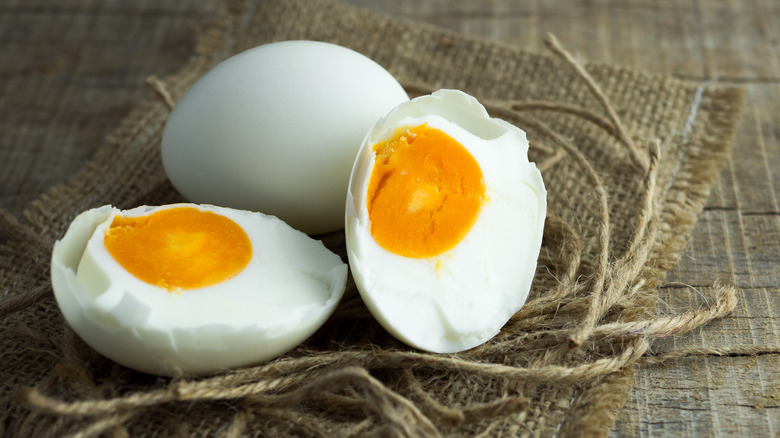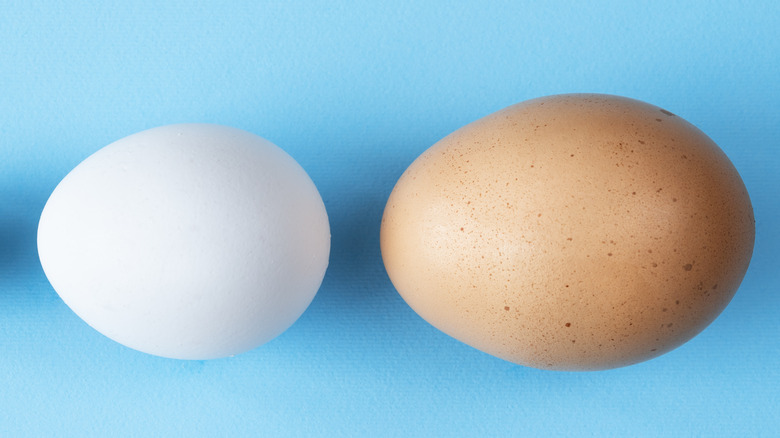Duck Eggs Vs. Chicken Eggs: What's The Difference?
We all know the difference between duck and chicken eggs, right? Duck eggs come from ducks. Chicken eggs come from chickens. There, that's it. Problem solved, article finished. Wait ... there's more to it than that? Of course there is. Apart from being the products of different birds, there are a variety of differences between duck and chicken eggs to take into consideration, such as nutrition, size, taste, texture, substitutions, and price.
While not nearly as popular as the ones from their chicken brethren, duck eggs are becoming more readily available through farms, farmers markets, and higher-end grocery stores such as Whole Foods (via Modern Farmer). There is also the fact that eggs in general have now been deemed acceptable to eat after cholesterol concerns were largely debunked, per Chicago Tribune. Overall, the nutritional benefits of poultry and waterfowl eggs far outweigh any perceived damages. And while they may not be as widely consumed as their clucking cousins, duck eggs stand on their own merits as a delicious and nutritious alternative.
Chicken egg nutrition
While chicken eggs are smaller than duck eggs, they nevertheless pack quite the nutritious punch. Here are some basic nutrient facts for one hen's egg according to the USDA: 72 calories, 4.75 grams of fat, 6.3 grams of protein, 0.5 milligrams of iron, and 24.2 milligrams of calcium. The total cholesterol is 184.5 milligrams, which is 61% of your daily value. Though this sounds high, Healthline posits that most healthy adults can eat one to two eggs per day without issue, depending on what the rest of their diet looks like. Chicken eggs are also sources of key vitamins such as B12, D, E, and a rather obscure nutrient called choline.
Though not many of us may have heard of it, LiveStrong informs us that choline is one of the most important nutritious elements of an egg. Choline is a nutrient that supports memory and cognitive function. Returning to the USDA statistics, we can see that the average chicken egg contains 139.8 milligrams or 25% of your daily value of choline. So, if you eat two eggs at breakfast, you are essentially taking in 50% of your daily value. Not only are you getting an excellent source of protein and vitamins, but you're also improving your brain function. Thanks, chickens!
Duck egg nutrition
Ducks are, in general, larger than chickens, and therefore produce larger eggs. This is an important factor to take into consideration when assessing the nutritional elements of a duck egg. According to Healthline, it is due to the larger size of duck egg yolks that they are deemed more nutritious than chicken eggs. The average duck egg contains 185 calories, 13 grams of protein, 14 grams of fat, and 1 gram of carbohydrates. They also boast a high percentage of your daily value of cholesterol (295%), vitamin B-12 (90%), selenium (52%), riboflavin (24%), vitamin D (17%), iron (21%), and that all-important choline (263 milligrams).
Duck eggs are also high in omega-3 fatty acids, according to Modern Farmer. As WebMD tells us, omega-3 fatty acids are crucial to maintaining good health. They improve overall bodily function but are particularly known for benefitting the brain, aiding in its development and sharpening mental acuity. Omega-3s are also useful for improving depression and ailments such as asthma and rheumatoid arthritis. All in all, duck eggs and chicken eggs stack up fairly well nutritionally speaking.
Shell size, thickness, and color differences
According to The Happy Chicken Coop, duck eggs are 50% larger than the jumbo chicken eggs you'll find in the refrigerator aisle of your grocery store. They may not look so from a distance, but a close-up examination reveals just how much larger a duck egg is when compared to its chicken counterpart. Egg sizes vary depending on the type of duck, with smaller duck eggs weighing in around 1.55 ounces and jumbo eggs weighing around 2.5 ounces. The weight is mostly thanks to the larger yolk but is also due to the duck egg's thicker shell, which also contributes to the egg's longer shelf life.
Although we are accustomed to seeing white and brown eggs at the store, both duck and chicken eggs offer a wide variety of colors. According to Purina Mills, Ameraucana and Olive chickens lay light blue and pastel green eggs, respectively. The popular Cayuga duck lays eggs on the gray to the black color spectrum, with some arriving as lighter, ashy colors while others can be almost completely black (via Modern Farmer). Other duck species will lay white, brown, and even green-colored eggs.
Substituting chicken eggs with duck eggs in recipes
So you've decided it's worth your time and money to purchase some duck eggs. What to do with them? Well, you can treat them as a normal egg when it comes to breakfast, whether by poaching or frying. In cooking them this way, you'll immediately notice how much larger and more vibrantly orange the yolk is. Cook's Illustrated compared the taste and texture of duck eggs versus chicken eggs by making several batches of scrambled eggs with each. They found that the duck egg scramble was "decidedly richer, with earthy, grassy flavors" and more rigid in texture.
It is because of these differences in texture, taste, and consistency that Cook's Illustrated advises against swapping egg types in recipes. However, if all you have are duck eggs, there is a ratio you can follow. Lisa Steele of HGTV explains that due to the size and weight of duck eggs, the ratio for baking is 2:3, where 2 duck eggs are equivalent to 3 chicken eggs. She has also used a 1:1 ratio and has found little to no difference.
Price differences of chicken and duck eggs
With food prices on the rise, it is important to look at the economic differences between duck and chicken eggs (per The Washington Post). Obviously, because of the massive scale of industrial chicken egg production in the United States — a $350 billion industry to be exact — they are going to come out as the cheaper option. According to FRED Economic Data, the national average cost of a dozen, large white chicken eggs was $3.11 in August of 2022.
Duck eggs exist on a completely different metric. According to Modern Farmer, duck egg production is not tracked by the USDA. So while there is no clear numerical value to give to duck eggs, the majority of farmers and grocers sell them for between $6 to $12 per dozen on average. While duck eggs are more expensive, they have the added benefits of being marginally more nutritious than chicken eggs and are potentially more sustainable. The Healthy states that because ducks are game birds, which forage on what's available naturally as opposed to relying on feed, they require less resources and are a great sustainable meat option moving forward.





